University Report: Culture, Diversity, and Health Assessment
VerifiedAdded on 2021/04/17
|10
|2399
|233
Report
AI Summary
This report provides a comprehensive assessment of culture, diversity, and health within the healthcare context. It begins by establishing the author's qualifications for a cultural support worker role, emphasizing knowledge of behavioral science in health and NSW Health Policy. The report then explores the theoretical relevance of culture, ethnicity, socioeconomic status, and cultural competence, using practical examples to illustrate these concepts. Key elements and principles of cultural competency are advocated, with a focus on training, evaluation, and stakeholder involvement. The report analyzes the relationship between NSW Health Policy, professional requirements, and dimensions of cultural competence, highlighting the application of these competencies in practice. Issues affecting cultural and social practices in the workplace and for customers are identified, along with innovative strategies for creating culturally and socially safe health services. The report concludes with a justification of the role and a list of relevant references. The report underscores the importance of adapting healthcare practices to accommodate diverse cultural backgrounds and socioeconomic statuses, promoting equitable and effective healthcare delivery.
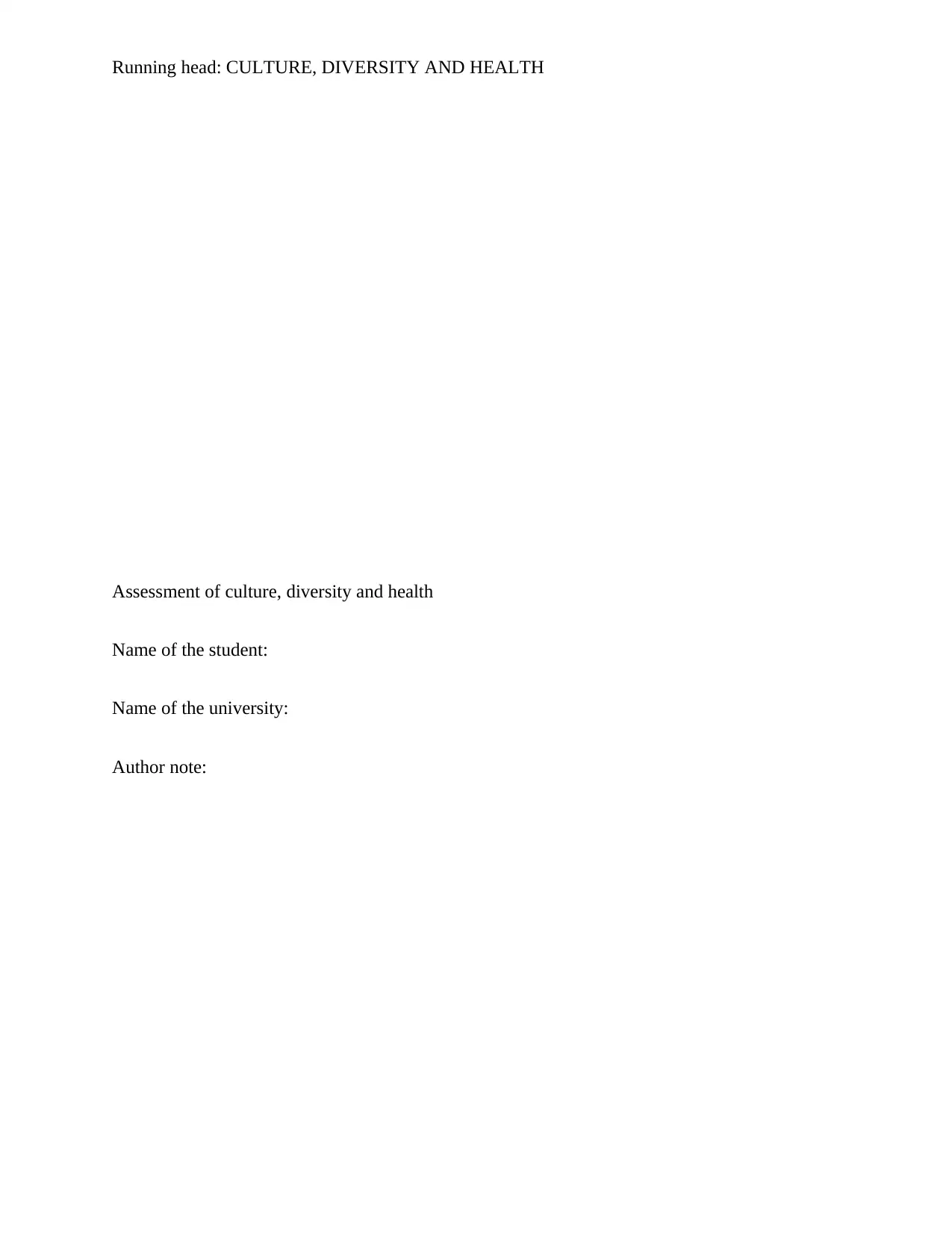
Running head: CULTURE, DIVERSITY AND HEALTH
Assessment of culture, diversity and health
Name of the student:
Name of the university:
Author note:
Assessment of culture, diversity and health
Name of the student:
Name of the university:
Author note:
Paraphrase This Document
Need a fresh take? Get an instant paraphrase of this document with our AI Paraphraser
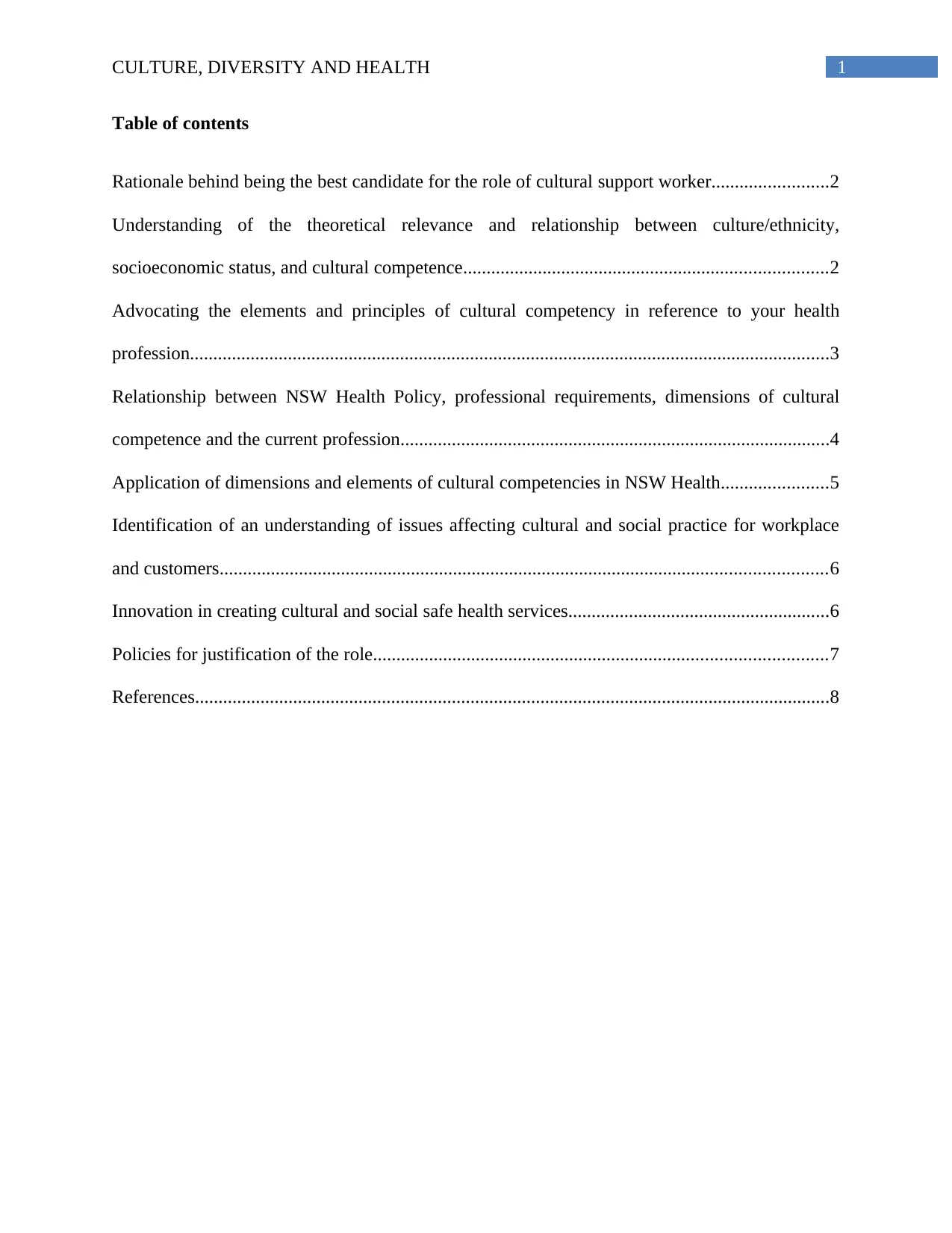
1CULTURE, DIVERSITY AND HEALTH
Table of contents
Rationale behind being the best candidate for the role of cultural support worker.........................2
Understanding of the theoretical relevance and relationship between culture/ethnicity,
socioeconomic status, and cultural competence..............................................................................2
Advocating the elements and principles of cultural competency in reference to your health
profession.........................................................................................................................................3
Relationship between NSW Health Policy, professional requirements, dimensions of cultural
competence and the current profession............................................................................................4
Application of dimensions and elements of cultural competencies in NSW Health.......................5
Identification of an understanding of issues affecting cultural and social practice for workplace
and customers..................................................................................................................................6
Innovation in creating cultural and social safe health services........................................................6
Policies for justification of the role.................................................................................................7
References........................................................................................................................................8
Table of contents
Rationale behind being the best candidate for the role of cultural support worker.........................2
Understanding of the theoretical relevance and relationship between culture/ethnicity,
socioeconomic status, and cultural competence..............................................................................2
Advocating the elements and principles of cultural competency in reference to your health
profession.........................................................................................................................................3
Relationship between NSW Health Policy, professional requirements, dimensions of cultural
competence and the current profession............................................................................................4
Application of dimensions and elements of cultural competencies in NSW Health.......................5
Identification of an understanding of issues affecting cultural and social practice for workplace
and customers..................................................................................................................................6
Innovation in creating cultural and social safe health services........................................................6
Policies for justification of the role.................................................................................................7
References........................................................................................................................................8
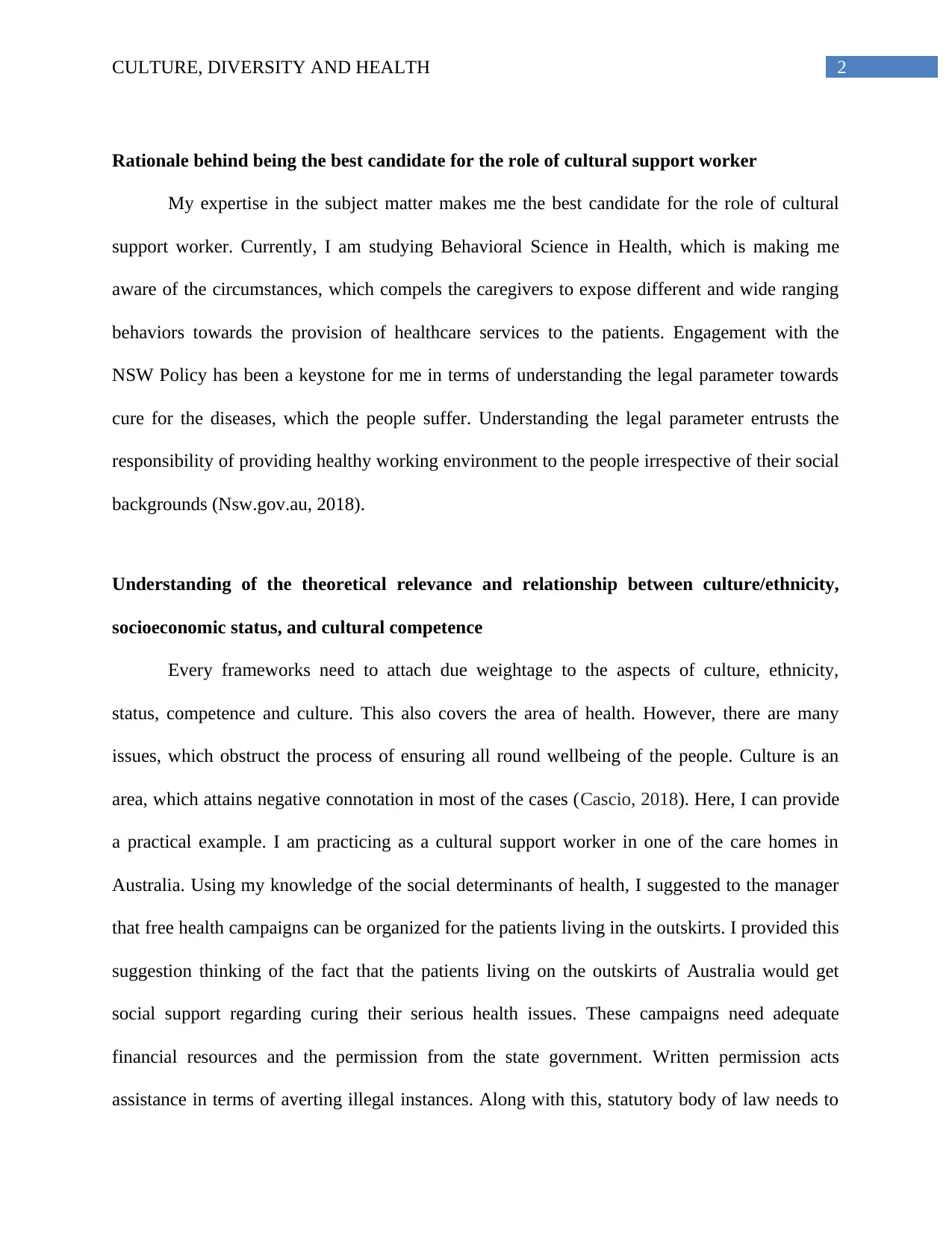
2CULTURE, DIVERSITY AND HEALTH
Rationale behind being the best candidate for the role of cultural support worker
My expertise in the subject matter makes me the best candidate for the role of cultural
support worker. Currently, I am studying Behavioral Science in Health, which is making me
aware of the circumstances, which compels the caregivers to expose different and wide ranging
behaviors towards the provision of healthcare services to the patients. Engagement with the
NSW Policy has been a keystone for me in terms of understanding the legal parameter towards
cure for the diseases, which the people suffer. Understanding the legal parameter entrusts the
responsibility of providing healthy working environment to the people irrespective of their social
backgrounds (Nsw.gov.au, 2018).
Understanding of the theoretical relevance and relationship between culture/ethnicity,
socioeconomic status, and cultural competence
Every frameworks need to attach due weightage to the aspects of culture, ethnicity,
status, competence and culture. This also covers the area of health. However, there are many
issues, which obstruct the process of ensuring all round wellbeing of the people. Culture is an
area, which attains negative connotation in most of the cases (Cascio, 2018). Here, I can provide
a practical example. I am practicing as a cultural support worker in one of the care homes in
Australia. Using my knowledge of the social determinants of health, I suggested to the manager
that free health campaigns can be organized for the patients living in the outskirts. I provided this
suggestion thinking of the fact that the patients living on the outskirts of Australia would get
social support regarding curing their serious health issues. These campaigns need adequate
financial resources and the permission from the state government. Written permission acts
assistance in terms of averting illegal instances. Along with this, statutory body of law needs to
Rationale behind being the best candidate for the role of cultural support worker
My expertise in the subject matter makes me the best candidate for the role of cultural
support worker. Currently, I am studying Behavioral Science in Health, which is making me
aware of the circumstances, which compels the caregivers to expose different and wide ranging
behaviors towards the provision of healthcare services to the patients. Engagement with the
NSW Policy has been a keystone for me in terms of understanding the legal parameter towards
cure for the diseases, which the people suffer. Understanding the legal parameter entrusts the
responsibility of providing healthy working environment to the people irrespective of their social
backgrounds (Nsw.gov.au, 2018).
Understanding of the theoretical relevance and relationship between culture/ethnicity,
socioeconomic status, and cultural competence
Every frameworks need to attach due weightage to the aspects of culture, ethnicity,
status, competence and culture. This also covers the area of health. However, there are many
issues, which obstruct the process of ensuring all round wellbeing of the people. Culture is an
area, which attains negative connotation in most of the cases (Cascio, 2018). Here, I can provide
a practical example. I am practicing as a cultural support worker in one of the care homes in
Australia. Using my knowledge of the social determinants of health, I suggested to the manager
that free health campaigns can be organized for the patients living in the outskirts. I provided this
suggestion thinking of the fact that the patients living on the outskirts of Australia would get
social support regarding curing their serious health issues. These campaigns need adequate
financial resources and the permission from the state government. Written permission acts
assistance in terms of averting illegal instances. Along with this, statutory body of law needs to
⊘ This is a preview!⊘
Do you want full access?
Subscribe today to unlock all pages.

Trusted by 1+ million students worldwide
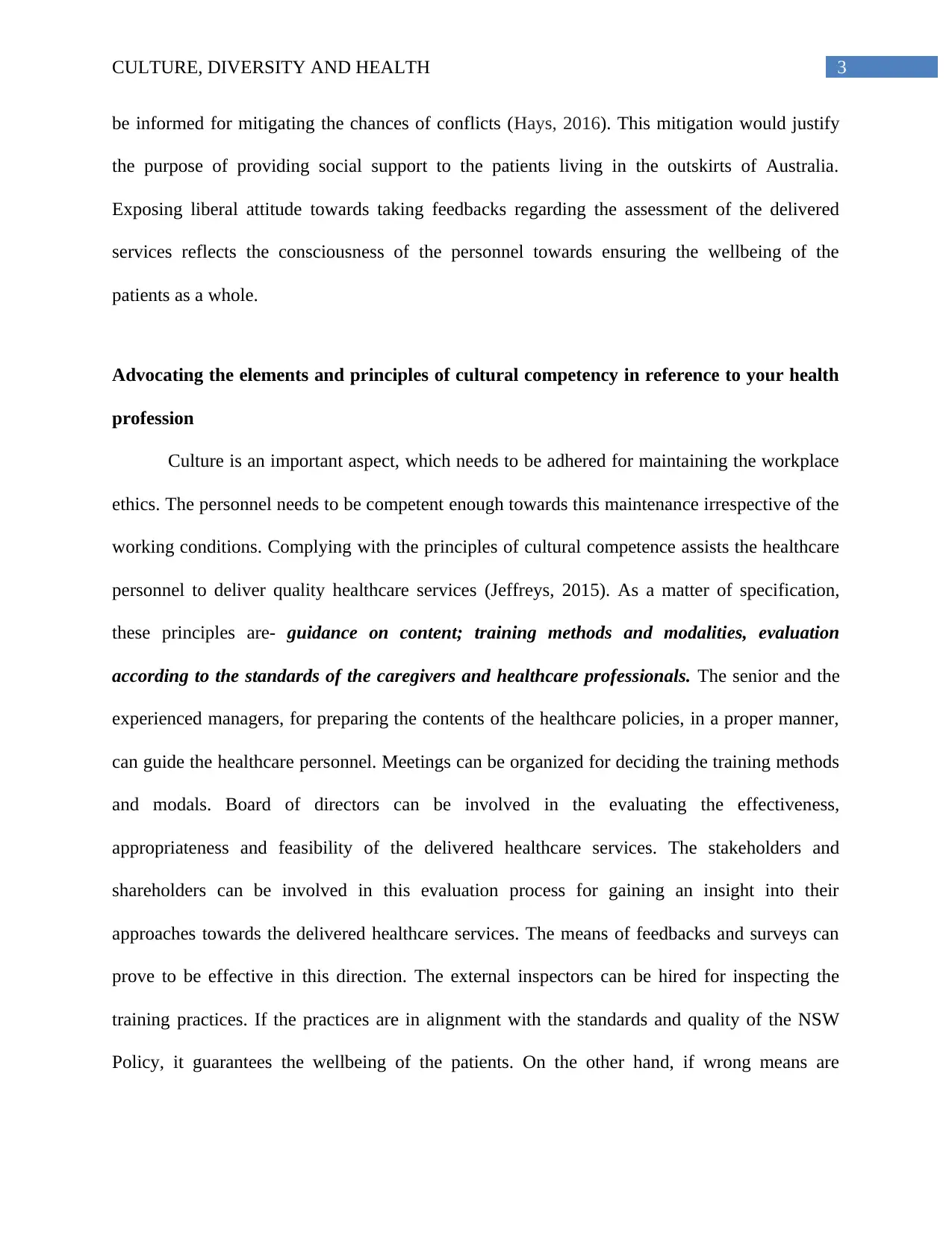
3CULTURE, DIVERSITY AND HEALTH
be informed for mitigating the chances of conflicts (Hays, 2016). This mitigation would justify
the purpose of providing social support to the patients living in the outskirts of Australia.
Exposing liberal attitude towards taking feedbacks regarding the assessment of the delivered
services reflects the consciousness of the personnel towards ensuring the wellbeing of the
patients as a whole.
Advocating the elements and principles of cultural competency in reference to your health
profession
Culture is an important aspect, which needs to be adhered for maintaining the workplace
ethics. The personnel needs to be competent enough towards this maintenance irrespective of the
working conditions. Complying with the principles of cultural competence assists the healthcare
personnel to deliver quality healthcare services (Jeffreys, 2015). As a matter of specification,
these principles are- guidance on content; training methods and modalities, evaluation
according to the standards of the caregivers and healthcare professionals. The senior and the
experienced managers, for preparing the contents of the healthcare policies, in a proper manner,
can guide the healthcare personnel. Meetings can be organized for deciding the training methods
and modals. Board of directors can be involved in the evaluating the effectiveness,
appropriateness and feasibility of the delivered healthcare services. The stakeholders and
shareholders can be involved in this evaluation process for gaining an insight into their
approaches towards the delivered healthcare services. The means of feedbacks and surveys can
prove to be effective in this direction. The external inspectors can be hired for inspecting the
training practices. If the practices are in alignment with the standards and quality of the NSW
Policy, it guarantees the wellbeing of the patients. On the other hand, if wrong means are
be informed for mitigating the chances of conflicts (Hays, 2016). This mitigation would justify
the purpose of providing social support to the patients living in the outskirts of Australia.
Exposing liberal attitude towards taking feedbacks regarding the assessment of the delivered
services reflects the consciousness of the personnel towards ensuring the wellbeing of the
patients as a whole.
Advocating the elements and principles of cultural competency in reference to your health
profession
Culture is an important aspect, which needs to be adhered for maintaining the workplace
ethics. The personnel needs to be competent enough towards this maintenance irrespective of the
working conditions. Complying with the principles of cultural competence assists the healthcare
personnel to deliver quality healthcare services (Jeffreys, 2015). As a matter of specification,
these principles are- guidance on content; training methods and modalities, evaluation
according to the standards of the caregivers and healthcare professionals. The senior and the
experienced managers, for preparing the contents of the healthcare policies, in a proper manner,
can guide the healthcare personnel. Meetings can be organized for deciding the training methods
and modals. Board of directors can be involved in the evaluating the effectiveness,
appropriateness and feasibility of the delivered healthcare services. The stakeholders and
shareholders can be involved in this evaluation process for gaining an insight into their
approaches towards the delivered healthcare services. The means of feedbacks and surveys can
prove to be effective in this direction. The external inspectors can be hired for inspecting the
training practices. If the practices are in alignment with the standards and quality of the NSW
Policy, it guarantees the wellbeing of the patients. On the other hand, if wrong means are
Paraphrase This Document
Need a fresh take? Get an instant paraphrase of this document with our AI Paraphraser
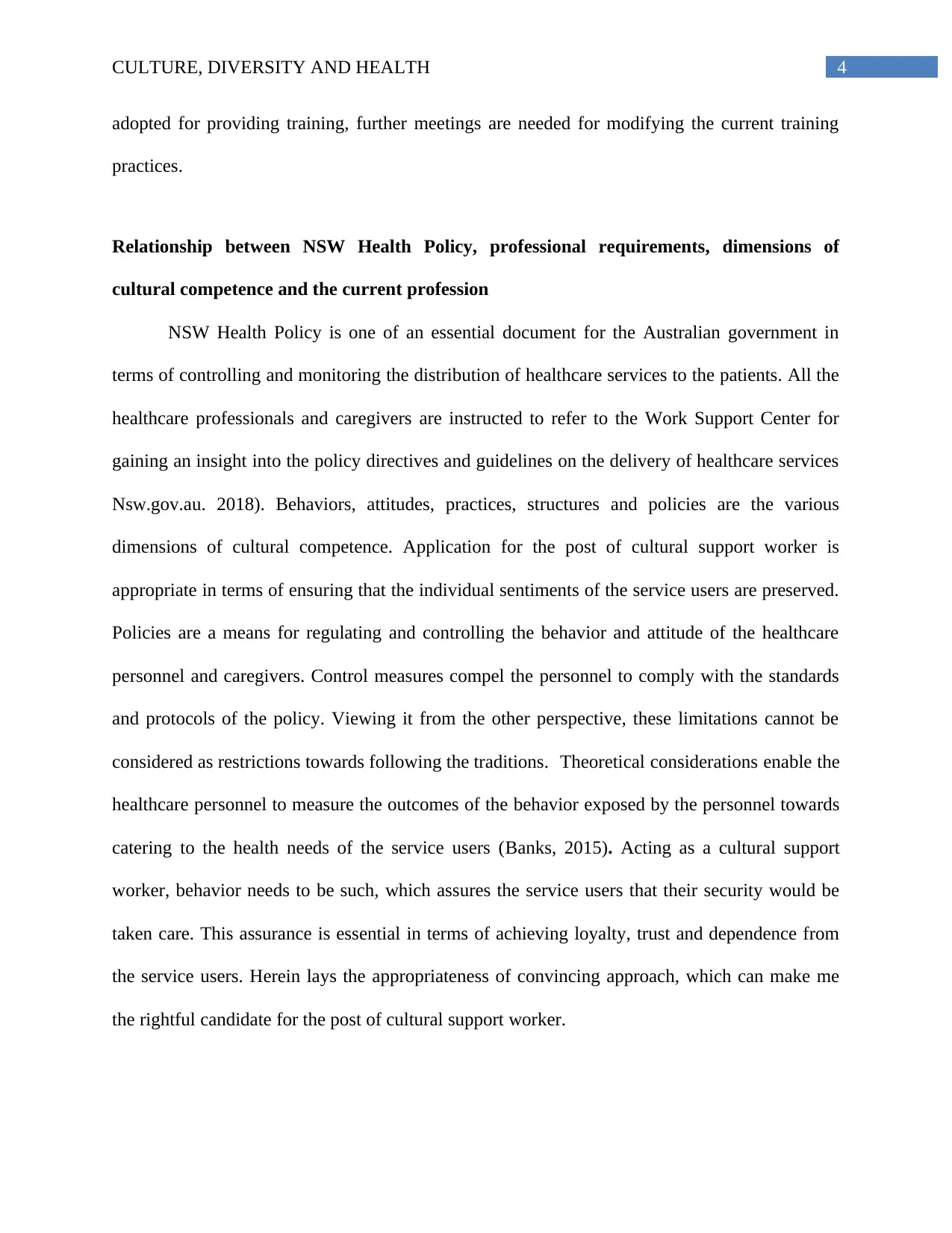
4CULTURE, DIVERSITY AND HEALTH
adopted for providing training, further meetings are needed for modifying the current training
practices.
Relationship between NSW Health Policy, professional requirements, dimensions of
cultural competence and the current profession
NSW Health Policy is one of an essential document for the Australian government in
terms of controlling and monitoring the distribution of healthcare services to the patients. All the
healthcare professionals and caregivers are instructed to refer to the Work Support Center for
gaining an insight into the policy directives and guidelines on the delivery of healthcare services
Nsw.gov.au. 2018). Behaviors, attitudes, practices, structures and policies are the various
dimensions of cultural competence. Application for the post of cultural support worker is
appropriate in terms of ensuring that the individual sentiments of the service users are preserved.
Policies are a means for regulating and controlling the behavior and attitude of the healthcare
personnel and caregivers. Control measures compel the personnel to comply with the standards
and protocols of the policy. Viewing it from the other perspective, these limitations cannot be
considered as restrictions towards following the traditions. Theoretical considerations enable the
healthcare personnel to measure the outcomes of the behavior exposed by the personnel towards
catering to the health needs of the service users (Banks, 2015). Acting as a cultural support
worker, behavior needs to be such, which assures the service users that their security would be
taken care. This assurance is essential in terms of achieving loyalty, trust and dependence from
the service users. Herein lays the appropriateness of convincing approach, which can make me
the rightful candidate for the post of cultural support worker.
adopted for providing training, further meetings are needed for modifying the current training
practices.
Relationship between NSW Health Policy, professional requirements, dimensions of
cultural competence and the current profession
NSW Health Policy is one of an essential document for the Australian government in
terms of controlling and monitoring the distribution of healthcare services to the patients. All the
healthcare professionals and caregivers are instructed to refer to the Work Support Center for
gaining an insight into the policy directives and guidelines on the delivery of healthcare services
Nsw.gov.au. 2018). Behaviors, attitudes, practices, structures and policies are the various
dimensions of cultural competence. Application for the post of cultural support worker is
appropriate in terms of ensuring that the individual sentiments of the service users are preserved.
Policies are a means for regulating and controlling the behavior and attitude of the healthcare
personnel and caregivers. Control measures compel the personnel to comply with the standards
and protocols of the policy. Viewing it from the other perspective, these limitations cannot be
considered as restrictions towards following the traditions. Theoretical considerations enable the
healthcare personnel to measure the outcomes of the behavior exposed by the personnel towards
catering to the health needs of the service users (Banks, 2015). Acting as a cultural support
worker, behavior needs to be such, which assures the service users that their security would be
taken care. This assurance is essential in terms of achieving loyalty, trust and dependence from
the service users. Herein lays the appropriateness of convincing approach, which can make me
the rightful candidate for the post of cultural support worker.
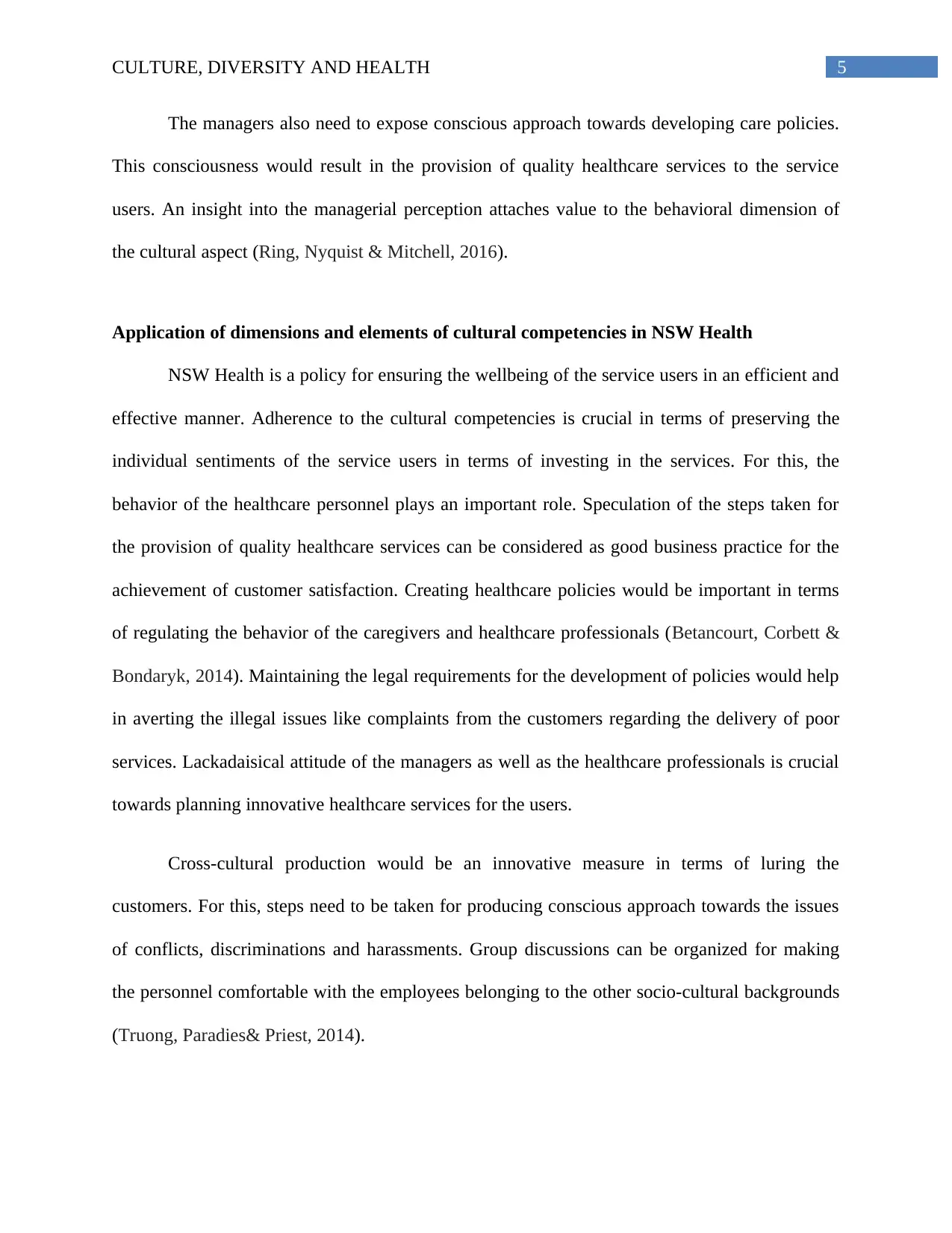
5CULTURE, DIVERSITY AND HEALTH
The managers also need to expose conscious approach towards developing care policies.
This consciousness would result in the provision of quality healthcare services to the service
users. An insight into the managerial perception attaches value to the behavioral dimension of
the cultural aspect (Ring, Nyquist & Mitchell, 2016).
Application of dimensions and elements of cultural competencies in NSW Health
NSW Health is a policy for ensuring the wellbeing of the service users in an efficient and
effective manner. Adherence to the cultural competencies is crucial in terms of preserving the
individual sentiments of the service users in terms of investing in the services. For this, the
behavior of the healthcare personnel plays an important role. Speculation of the steps taken for
the provision of quality healthcare services can be considered as good business practice for the
achievement of customer satisfaction. Creating healthcare policies would be important in terms
of regulating the behavior of the caregivers and healthcare professionals (Betancourt, Corbett &
Bondaryk, 2014). Maintaining the legal requirements for the development of policies would help
in averting the illegal issues like complaints from the customers regarding the delivery of poor
services. Lackadaisical attitude of the managers as well as the healthcare professionals is crucial
towards planning innovative healthcare services for the users.
Cross-cultural production would be an innovative measure in terms of luring the
customers. For this, steps need to be taken for producing conscious approach towards the issues
of conflicts, discriminations and harassments. Group discussions can be organized for making
the personnel comfortable with the employees belonging to the other socio-cultural backgrounds
(Truong, Paradies& Priest, 2014).
The managers also need to expose conscious approach towards developing care policies.
This consciousness would result in the provision of quality healthcare services to the service
users. An insight into the managerial perception attaches value to the behavioral dimension of
the cultural aspect (Ring, Nyquist & Mitchell, 2016).
Application of dimensions and elements of cultural competencies in NSW Health
NSW Health is a policy for ensuring the wellbeing of the service users in an efficient and
effective manner. Adherence to the cultural competencies is crucial in terms of preserving the
individual sentiments of the service users in terms of investing in the services. For this, the
behavior of the healthcare personnel plays an important role. Speculation of the steps taken for
the provision of quality healthcare services can be considered as good business practice for the
achievement of customer satisfaction. Creating healthcare policies would be important in terms
of regulating the behavior of the caregivers and healthcare professionals (Betancourt, Corbett &
Bondaryk, 2014). Maintaining the legal requirements for the development of policies would help
in averting the illegal issues like complaints from the customers regarding the delivery of poor
services. Lackadaisical attitude of the managers as well as the healthcare professionals is crucial
towards planning innovative healthcare services for the users.
Cross-cultural production would be an innovative measure in terms of luring the
customers. For this, steps need to be taken for producing conscious approach towards the issues
of conflicts, discriminations and harassments. Group discussions can be organized for making
the personnel comfortable with the employees belonging to the other socio-cultural backgrounds
(Truong, Paradies& Priest, 2014).
⊘ This is a preview!⊘
Do you want full access?
Subscribe today to unlock all pages.

Trusted by 1+ million students worldwide
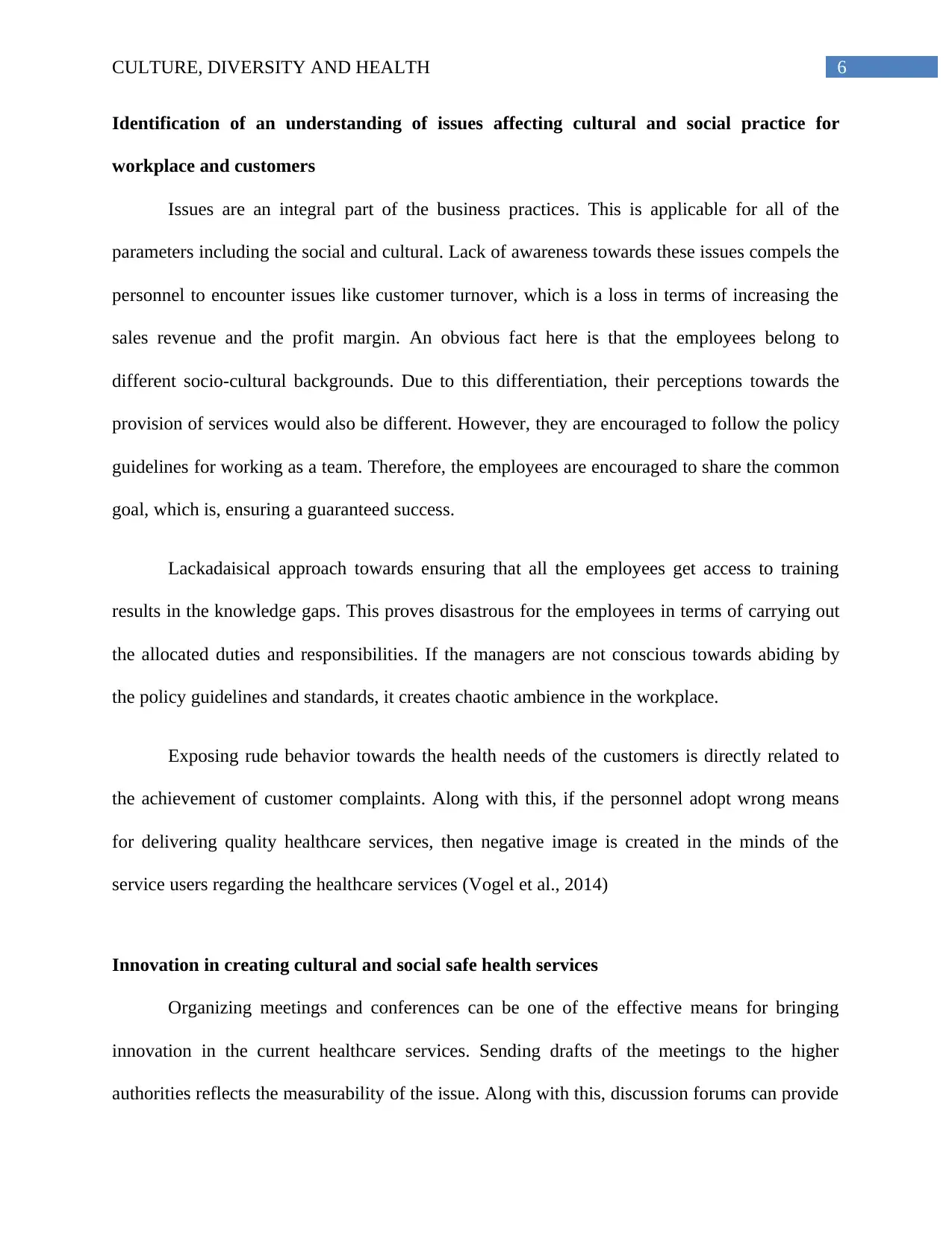
6CULTURE, DIVERSITY AND HEALTH
Identification of an understanding of issues affecting cultural and social practice for
workplace and customers
Issues are an integral part of the business practices. This is applicable for all of the
parameters including the social and cultural. Lack of awareness towards these issues compels the
personnel to encounter issues like customer turnover, which is a loss in terms of increasing the
sales revenue and the profit margin. An obvious fact here is that the employees belong to
different socio-cultural backgrounds. Due to this differentiation, their perceptions towards the
provision of services would also be different. However, they are encouraged to follow the policy
guidelines for working as a team. Therefore, the employees are encouraged to share the common
goal, which is, ensuring a guaranteed success.
Lackadaisical approach towards ensuring that all the employees get access to training
results in the knowledge gaps. This proves disastrous for the employees in terms of carrying out
the allocated duties and responsibilities. If the managers are not conscious towards abiding by
the policy guidelines and standards, it creates chaotic ambience in the workplace.
Exposing rude behavior towards the health needs of the customers is directly related to
the achievement of customer complaints. Along with this, if the personnel adopt wrong means
for delivering quality healthcare services, then negative image is created in the minds of the
service users regarding the healthcare services (Vogel et al., 2014)
Innovation in creating cultural and social safe health services
Organizing meetings and conferences can be one of the effective means for bringing
innovation in the current healthcare services. Sending drafts of the meetings to the higher
authorities reflects the measurability of the issue. Along with this, discussion forums can provide
Identification of an understanding of issues affecting cultural and social practice for
workplace and customers
Issues are an integral part of the business practices. This is applicable for all of the
parameters including the social and cultural. Lack of awareness towards these issues compels the
personnel to encounter issues like customer turnover, which is a loss in terms of increasing the
sales revenue and the profit margin. An obvious fact here is that the employees belong to
different socio-cultural backgrounds. Due to this differentiation, their perceptions towards the
provision of services would also be different. However, they are encouraged to follow the policy
guidelines for working as a team. Therefore, the employees are encouraged to share the common
goal, which is, ensuring a guaranteed success.
Lackadaisical approach towards ensuring that all the employees get access to training
results in the knowledge gaps. This proves disastrous for the employees in terms of carrying out
the allocated duties and responsibilities. If the managers are not conscious towards abiding by
the policy guidelines and standards, it creates chaotic ambience in the workplace.
Exposing rude behavior towards the health needs of the customers is directly related to
the achievement of customer complaints. Along with this, if the personnel adopt wrong means
for delivering quality healthcare services, then negative image is created in the minds of the
service users regarding the healthcare services (Vogel et al., 2014)
Innovation in creating cultural and social safe health services
Organizing meetings and conferences can be one of the effective means for bringing
innovation in the current healthcare services. Sending drafts of the meetings to the higher
authorities reflects the measurability of the issue. Along with this, discussion forums can provide
Paraphrase This Document
Need a fresh take? Get an instant paraphrase of this document with our AI Paraphraser
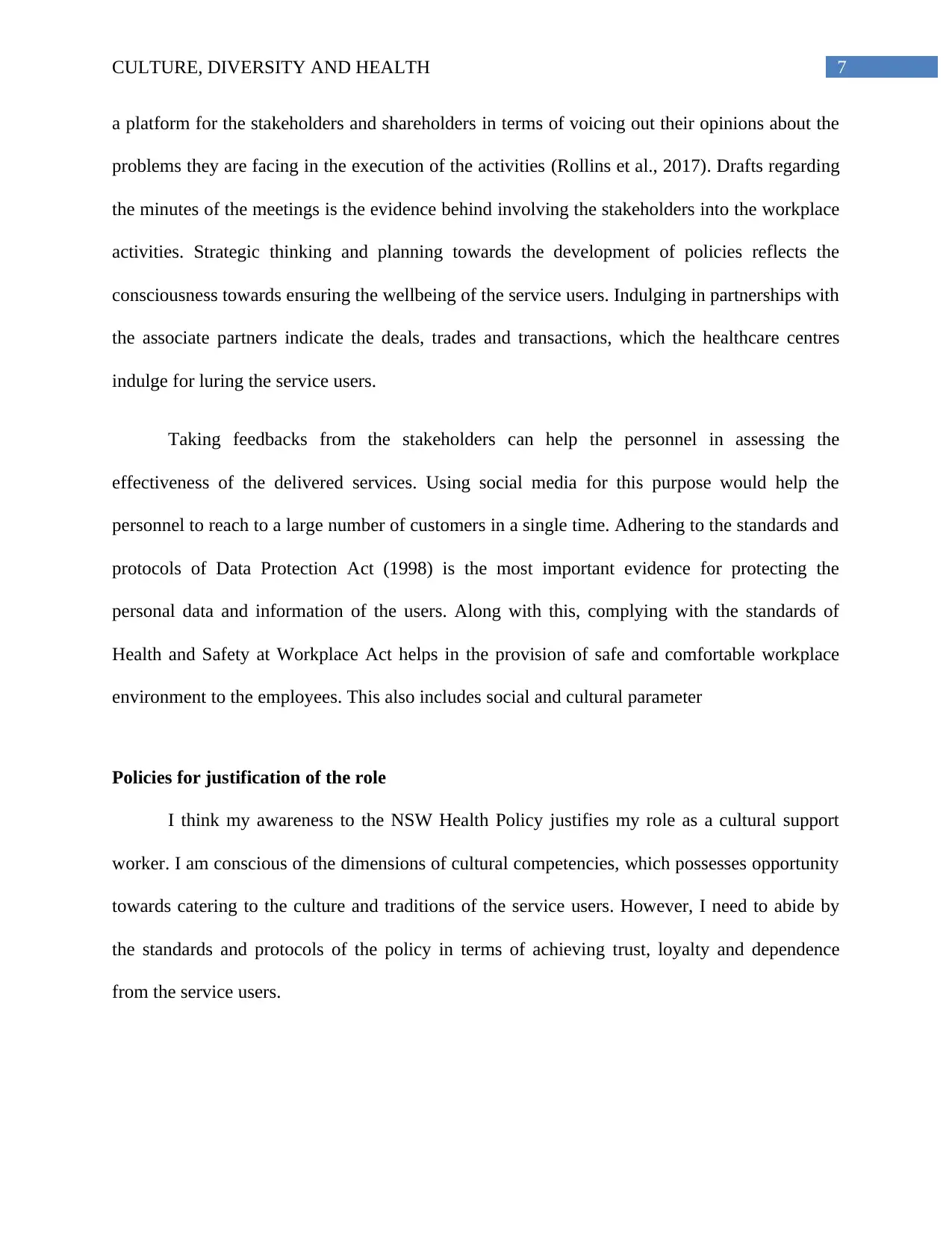
7CULTURE, DIVERSITY AND HEALTH
a platform for the stakeholders and shareholders in terms of voicing out their opinions about the
problems they are facing in the execution of the activities (Rollins et al., 2017). Drafts regarding
the minutes of the meetings is the evidence behind involving the stakeholders into the workplace
activities. Strategic thinking and planning towards the development of policies reflects the
consciousness towards ensuring the wellbeing of the service users. Indulging in partnerships with
the associate partners indicate the deals, trades and transactions, which the healthcare centres
indulge for luring the service users.
Taking feedbacks from the stakeholders can help the personnel in assessing the
effectiveness of the delivered services. Using social media for this purpose would help the
personnel to reach to a large number of customers in a single time. Adhering to the standards and
protocols of Data Protection Act (1998) is the most important evidence for protecting the
personal data and information of the users. Along with this, complying with the standards of
Health and Safety at Workplace Act helps in the provision of safe and comfortable workplace
environment to the employees. This also includes social and cultural parameter
Policies for justification of the role
I think my awareness to the NSW Health Policy justifies my role as a cultural support
worker. I am conscious of the dimensions of cultural competencies, which possesses opportunity
towards catering to the culture and traditions of the service users. However, I need to abide by
the standards and protocols of the policy in terms of achieving trust, loyalty and dependence
from the service users.
a platform for the stakeholders and shareholders in terms of voicing out their opinions about the
problems they are facing in the execution of the activities (Rollins et al., 2017). Drafts regarding
the minutes of the meetings is the evidence behind involving the stakeholders into the workplace
activities. Strategic thinking and planning towards the development of policies reflects the
consciousness towards ensuring the wellbeing of the service users. Indulging in partnerships with
the associate partners indicate the deals, trades and transactions, which the healthcare centres
indulge for luring the service users.
Taking feedbacks from the stakeholders can help the personnel in assessing the
effectiveness of the delivered services. Using social media for this purpose would help the
personnel to reach to a large number of customers in a single time. Adhering to the standards and
protocols of Data Protection Act (1998) is the most important evidence for protecting the
personal data and information of the users. Along with this, complying with the standards of
Health and Safety at Workplace Act helps in the provision of safe and comfortable workplace
environment to the employees. This also includes social and cultural parameter
Policies for justification of the role
I think my awareness to the NSW Health Policy justifies my role as a cultural support
worker. I am conscious of the dimensions of cultural competencies, which possesses opportunity
towards catering to the culture and traditions of the service users. However, I need to abide by
the standards and protocols of the policy in terms of achieving trust, loyalty and dependence
from the service users.
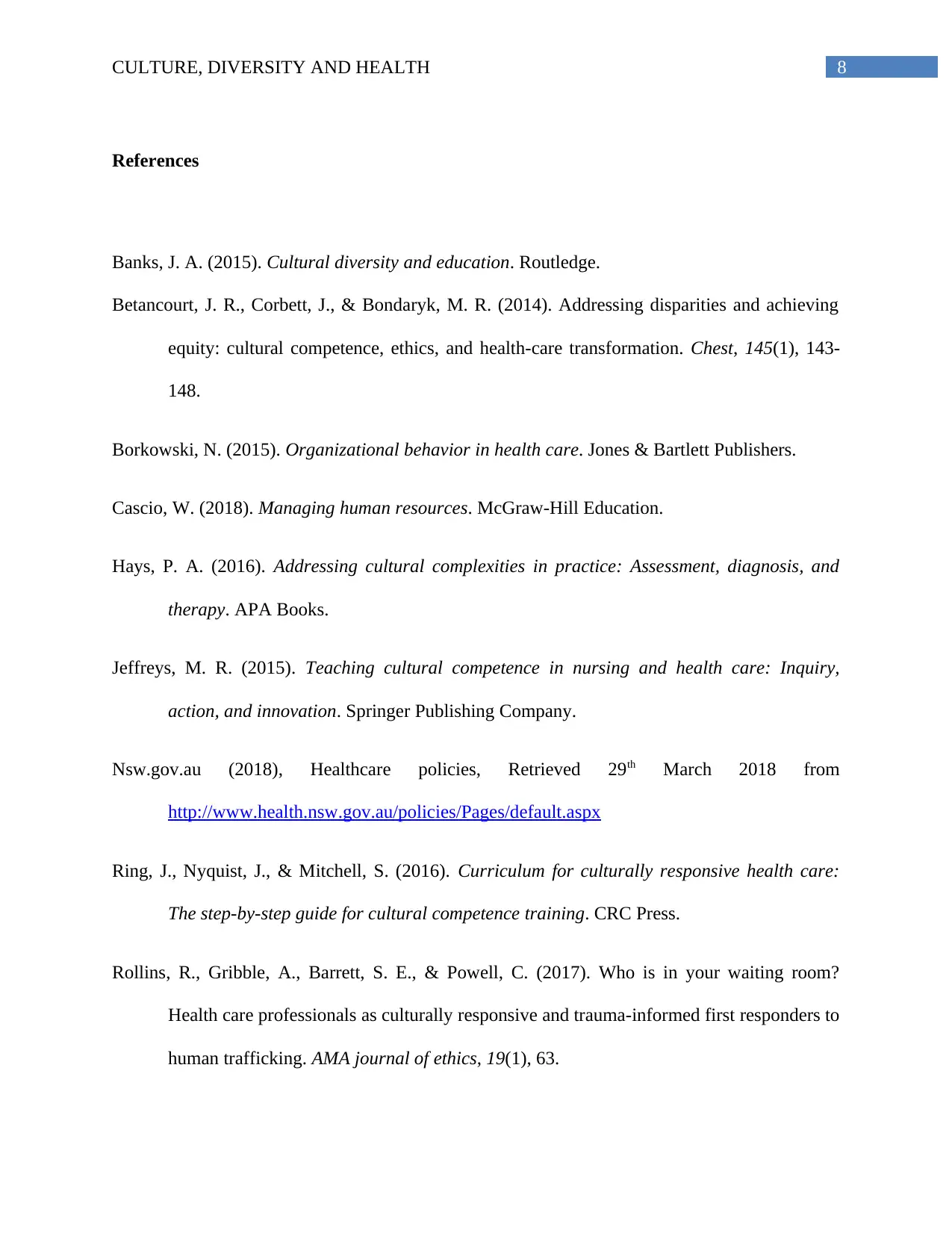
8CULTURE, DIVERSITY AND HEALTH
References
Banks, J. A. (2015). Cultural diversity and education. Routledge.
Betancourt, J. R., Corbett, J., & Bondaryk, M. R. (2014). Addressing disparities and achieving
equity: cultural competence, ethics, and health-care transformation. Chest, 145(1), 143-
148.
Borkowski, N. (2015). Organizational behavior in health care. Jones & Bartlett Publishers.
Cascio, W. (2018). Managing human resources. McGraw-Hill Education.
Hays, P. A. (2016). Addressing cultural complexities in practice: Assessment, diagnosis, and
therapy. APA Books.
Jeffreys, M. R. (2015). Teaching cultural competence in nursing and health care: Inquiry,
action, and innovation. Springer Publishing Company.
Nsw.gov.au (2018), Healthcare policies, Retrieved 29th March 2018 from
http://www.health.nsw.gov.au/policies/Pages/default.aspx
Ring, J., Nyquist, J., & Mitchell, S. (2016). Curriculum for culturally responsive health care:
The step-by-step guide for cultural competence training. CRC Press.
Rollins, R., Gribble, A., Barrett, S. E., & Powell, C. (2017). Who is in your waiting room?
Health care professionals as culturally responsive and trauma-informed first responders to
human trafficking. AMA journal of ethics, 19(1), 63.
References
Banks, J. A. (2015). Cultural diversity and education. Routledge.
Betancourt, J. R., Corbett, J., & Bondaryk, M. R. (2014). Addressing disparities and achieving
equity: cultural competence, ethics, and health-care transformation. Chest, 145(1), 143-
148.
Borkowski, N. (2015). Organizational behavior in health care. Jones & Bartlett Publishers.
Cascio, W. (2018). Managing human resources. McGraw-Hill Education.
Hays, P. A. (2016). Addressing cultural complexities in practice: Assessment, diagnosis, and
therapy. APA Books.
Jeffreys, M. R. (2015). Teaching cultural competence in nursing and health care: Inquiry,
action, and innovation. Springer Publishing Company.
Nsw.gov.au (2018), Healthcare policies, Retrieved 29th March 2018 from
http://www.health.nsw.gov.au/policies/Pages/default.aspx
Ring, J., Nyquist, J., & Mitchell, S. (2016). Curriculum for culturally responsive health care:
The step-by-step guide for cultural competence training. CRC Press.
Rollins, R., Gribble, A., Barrett, S. E., & Powell, C. (2017). Who is in your waiting room?
Health care professionals as culturally responsive and trauma-informed first responders to
human trafficking. AMA journal of ethics, 19(1), 63.
⊘ This is a preview!⊘
Do you want full access?
Subscribe today to unlock all pages.

Trusted by 1+ million students worldwide
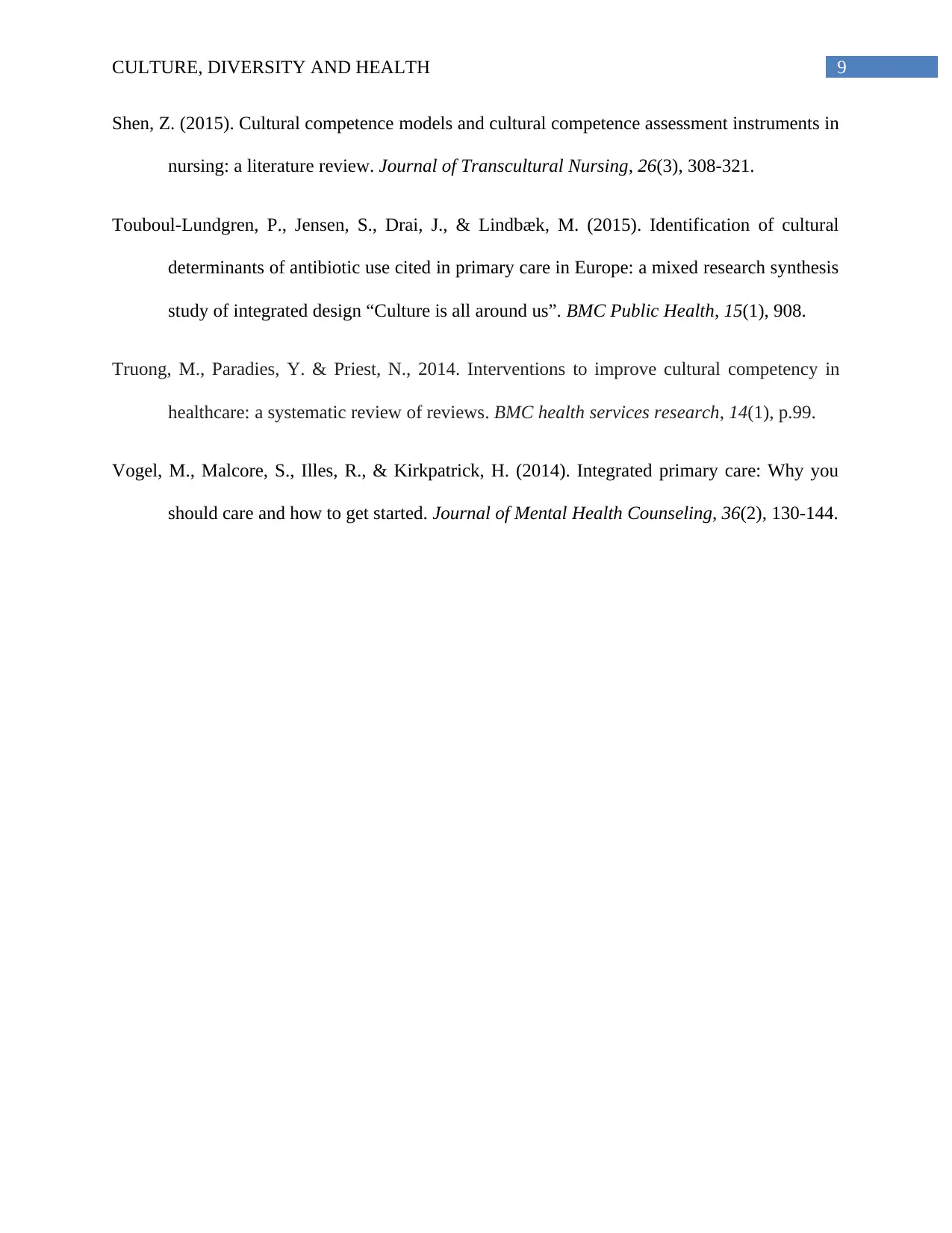
9CULTURE, DIVERSITY AND HEALTH
Shen, Z. (2015). Cultural competence models and cultural competence assessment instruments in
nursing: a literature review. Journal of Transcultural Nursing, 26(3), 308-321.
Touboul-Lundgren, P., Jensen, S., Drai, J., & Lindbæk, M. (2015). Identification of cultural
determinants of antibiotic use cited in primary care in Europe: a mixed research synthesis
study of integrated design “Culture is all around us”. BMC Public Health, 15(1), 908.
Truong, M., Paradies, Y. & Priest, N., 2014. Interventions to improve cultural competency in
healthcare: a systematic review of reviews. BMC health services research, 14(1), p.99.
Vogel, M., Malcore, S., Illes, R., & Kirkpatrick, H. (2014). Integrated primary care: Why you
should care and how to get started. Journal of Mental Health Counseling, 36(2), 130-144.
Shen, Z. (2015). Cultural competence models and cultural competence assessment instruments in
nursing: a literature review. Journal of Transcultural Nursing, 26(3), 308-321.
Touboul-Lundgren, P., Jensen, S., Drai, J., & Lindbæk, M. (2015). Identification of cultural
determinants of antibiotic use cited in primary care in Europe: a mixed research synthesis
study of integrated design “Culture is all around us”. BMC Public Health, 15(1), 908.
Truong, M., Paradies, Y. & Priest, N., 2014. Interventions to improve cultural competency in
healthcare: a systematic review of reviews. BMC health services research, 14(1), p.99.
Vogel, M., Malcore, S., Illes, R., & Kirkpatrick, H. (2014). Integrated primary care: Why you
should care and how to get started. Journal of Mental Health Counseling, 36(2), 130-144.
1 out of 10
Related Documents
Your All-in-One AI-Powered Toolkit for Academic Success.
+13062052269
info@desklib.com
Available 24*7 on WhatsApp / Email
![[object Object]](/_next/static/media/star-bottom.7253800d.svg)
Unlock your academic potential
Copyright © 2020–2026 A2Z Services. All Rights Reserved. Developed and managed by ZUCOL.





